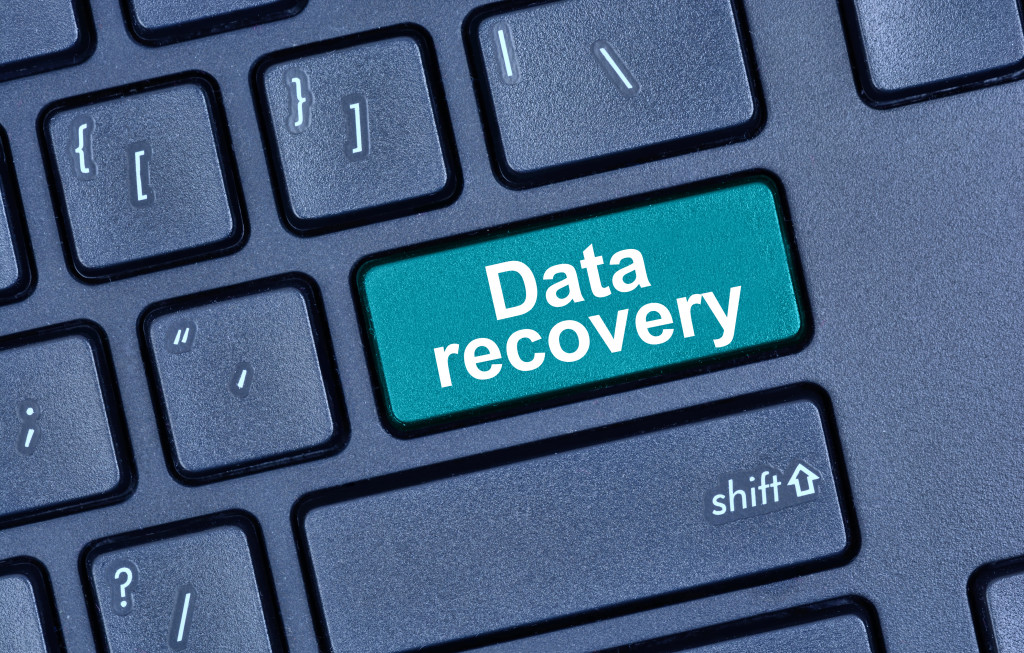- To quickly recover data, it’s crucial to have regular backups and store them offsite in the cloud.
- To protect stored data, use encryption and authentication protocols.
- Create alert systems that detect and send notifications regarding lost or corrupted data.
- Consider investing in dependable hardware equipped with RAID controllers to enhance fault tolerance.
Having a reliable data recovery plan is essential for any business. Data loss can lead to costly downtime, lost customers, and damaged reputation. That’s why it’s important to have a fast and effective data recovery strategy to get back up and running if an incident occurs quickly.
This article will discuss some of the key steps you need to take to ensure faster data recovery for your business. Following these tips ensures that your business has a comprehensive action plan should disaster strike.
Implement safety backup protocols.
Implementing safety backup protocols is one of the most important steps to take when planning for data recovery. Here are some tips on how to ensure your data is backed up safely:
Create and maintain regular backups.
Creating and maintaining regular business data backups is crucial to any well-managed organization. This process involves duplicating important information and storing it separately to protect against data loss or corruption. Backups can be made in physical or digital copies stored on a cloud server.
Regular backups ensure that important data can be recovered quickly if unexpected events occur, such as a system failure, computer virus, or natural disaster. This saves valuable time and resources and protects the business from reputational damage from lost or damaged data. As such, ensuring regular backups are created and maintained is an essential part of successful business management.
Make use of cloud storage solutions.

Cloud storage solutions to store backups offsite are becoming increasingly common for businesses of all sizes. This practice involves backing up important data and files offsite to a third-party cloud services provider rather than relying on on-premises storage solutions. This is critical because, in the event of a disaster or system failure, having backups stored offsite allows for faster data recovery and reduces the risk of losing critical data.
When considering cloud storage solutions, businesses should invest in reliable providers that provide a secure, scalable, and reliable service. This will ensure their data is protected and can be accessed when needed, providing peace of mind for business owners and IT administrators.
Set up alert systems for when data is lost or corrupted.
Properly setting up alert systems for when data is lost or corrupted is crucial for any business that relies heavily on data. Alert systems are warning mechanisms that notify relevant stakeholders immediately when data is lost or corrupted. This provides valuable time for businesses to start the data recovery process and minimize the disruption caused by data loss.
Without such alert systems, businesses can lose tremendous amounts of data without even realizing it, significantly affecting their operations. Additionally, implementing alert systems requires a clear understanding of the data management process, the data handling type, and the potential risks.
Utilize encryption and authentication protocols.

Utilizing encryption and authentication protocols is crucial for any business that values its stored data. Encryption refers to converting plain text data into a coded format, making it difficult for unauthorized individuals to access and interpret it.
On the other hand, authentication involves validating the user’s identity accessing the data. By implementing these security measures, businesses can protect their sensitive information from being compromised during transmission or storage.
This becomes even more important when sensitive data is stored, as it becomes a prime target for cybercriminals. Without these protocols, businesses risk losing valuable data, which can be costly and lead to the loss of customer trust.
Test backup files regularly.
Regularly testing backup files is crucial to managing data backup and recovery systems. This process entails verifying that backup files are valid, complete, and recoverable. To ensure that backup files are working as intended, businesses must conduct periodic testing of these files.
This step is important because backup files may become corrupted or lost over time, thereby rendering backups useless should they be required in the future. Without proper testing, businesses risk losing important data in case of a system crash or other disasters.
Invest in reliable hardware with high-quality features.
Investing in reliable hardware with high-quality features is crucial for any business that wants to operate efficiently. One such feature that businesses should consider is RAID controllers. The technology called RAID (Redundant Array of Independent Disks) combines multiple hard drives into a single unit.
This allows for faster access and transfer of data and increased fault tolerance. RAID controllers operate between the host system and the physical drives, ensuring that data is evenly distributed and backed up across all the disks in the array.
By investing in RAID controllers, businesses can reduce downtime and increase productivity by providing fast data recovery during disk failure. Proper investment in reliable hardware can be a smart and important step any business can take to ensure stable and effective operations.
These are just a few steps businesses can take to ensure fast and effective data recovery. Implementing these strategies can help businesses safeguard their data from loss or damage and reduce potential downtime from unforeseen events.












